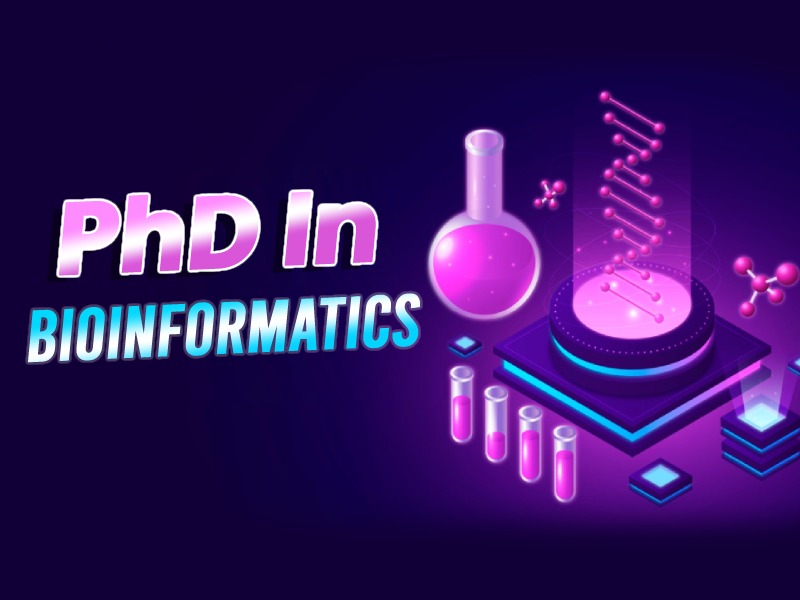Ph.D. in Bioinformatics: Introduction, Admission, Registration, Eligibility, Duration, Fees, Syllabus 2024

Introduction:
A Ph.D. in Bioinformatics equips students with advanced knowledge and research skills to analyze biological data using computational tools. The program merges disciplines such as biology, computer science, and statistics to enable the discovery of new biological insights and to create innovative tools for managing the complex data associated with modern biology. Through coursework, research projects, and dissertation work, students learn to develop algorithms, software, and computational models essential for solving problems in genomics, proteomics, and biomedicine. Graduates are prepared to lead in academia, industry, and research institutions, where they apply their skills to advance scientific knowledge and healthcare innovations.
Admission Process:
- Application Submission: Complete an online application including a statement of purpose and CV.
- Educational Background: Bachelor's or Master's degree in Bioinformatics, Biology, Computer Science, or a related field.
- GRE Scores: Required for most programs, though some may waive this requirement under certain conditions.
- Letters of Recommendation: Minimum of three letters from academic or professional references.
- Interviews: On-campus or virtual interviews with faculty members.
- Research Proposal: Submission of a research proposal that outlines the candidate's intended area of study.
Eligibility:
- Strong Background in Quantitative Sciences: Proficiency in areas such as statistics, mathematics, or computer science.
- Research Experience: Demonstrable experience, especially in computational biology or bioinformatics projects.
- Programming Skills: Proficiency in programming languages like Python, R, or Java.
- Analytical Skills: Strong analytical skills, with the ability to handle large datasets.
- Educational Credentials: A Master’s degree is preferred, although motivated candidates with a Bachelor's degree may also be considered.
- Interdisciplinary Knowledge: Understanding of both biological sciences and computational analysis.
Completion Time:
The typical duration for completing a Ph.D. in Bioinformatics ranges from 4 to 6 years. The first year usually involves core coursework and passing preliminary exams. The remaining years are dedicated to conducting independent research, attending workshops and seminars, presenting at conferences, and writing and defending a doctoral dissertation. Progress depends on the research area's complexity, data availability, and the specific requirements of the research advisor and institution.
Career Opportunities:
- Academic Researcher/Professor: Conduct research and teach at universities.
- Biotech/Pharmaceutical Industries: Develop new drugs and genetic research.
- Computational Biologist: Analyze biological data and create computational models.
- Genomics Specialist: Work on genome sequencing and analysis projects.
- Data Scientist in Healthcare: Analyze clinical data to improve healthcare outcomes.
- Bioinformatics Software Developer: Develop software tools to aid in biological research.
Syllabus:
- Computational Methods in Bioinformatics
- Genomic Technologies and Bioinformatics
- Statistical Methods for Bioinformatics
- Machine Learning Applications in Genomics
- Systems Biology
- Protein Structure and Function
Internship Opportunities:
- Pharmaceutical Companies: Drug discovery and development.
- Research Institutions: Collaborative research projects.
- Biotechnology Firms: Genomic research and development.
- Healthcare Organizations: Clinical data analysis.
- Tech Companies: Developing bioinformatics tools and software.
- Government and Nonprofit Organizations: Public health and epidemiology studies.
Scholarship and Grants:
- Research Grants: Funding for specific bioinformatics research projects.
- Teaching Assistantships: Financial support in exchange for teaching responsibilities.
- Fellowships: Merit-based awards covering tuition and providing a stipend.
- Conference Sponsorships: Funding to present research at national and international conferences.
- Industry Sponsored Grants: Support from biotech and pharmaceutical companies.
- Government Scholarships: Financial aid from government health and science departments.
FAQs:
What is the expected completion time for a Ph.D. in Bioinformatics?
Typically 4-6 years.
What are the prerequisites for applying to a Ph.D. in Bioinformatics?
A background in quantitative sciences, programming skills, and a Bachelor's or Master's degree in a related field.
What career options are available after earning a Ph.D. in Bioinformatics?
Opportunities in academia, industry, healthcare, and research institutions.
Are there opportunities for practical training during the Ph.D.?
Yes, many programs offer internships and collaborative projects with industry and research institutions.
Is funding available for Ph.D. students in Bioinformatics?
Yes, there are numerous scholarships, grants, and fellowships available.
What skills are critical for success in a Ph.D. program in Bioinformatics?
Strong analytical skills, programming proficiency, and a good grasp of both biological and computational sciences.
